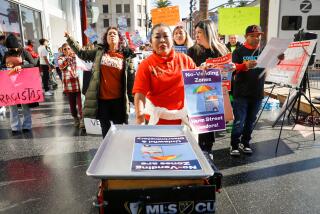NASD to Give Justice Dept. Records Sought in Investigation : Inquiry: Agreement comes one day before a hearing was to be held on complaint that Nasdaq’s parent was not cooperating.
Heading off a showdown in court, the National Assn. of Securities Dealers gave in Wednesday to a Justice Department demand that it turn over extensive records in the government’s inquiry into alleged price-fixing of Nasdaq stocks.
The last-minute agreement, filed in federal court in New York, came just before a hearing was to be held today on a Justice Department complaint that the NASD, Nasdaq’s parent, was not cooperating with the civil antitrust investigation.
The Justice Department’s antitrust division filed court papers in October accusing the NASD of refusing to turn over documents in the inquiry. Gina Talamona, spokeswoman for the antitrust division, said the agreement means that the Justice Department will get all the documents it is seeking.
The agreement requires the NASD to produce the documents by Dec. 15. Talamona said the NASD had already begun turning over some of the documents it had withheld, handing over more than 500,000 pages since the Justice Department complained in October.
Phillip H. Rudolph, one of the lawyers representing the NASD, said the organization continued to deny that it had failed to cooperate with the investigation. “We have no intention of doing anything other than cooperating with the Justice Department in this investigation,” he said.
Since last year, the antitrust division has been looking into allegations that Nasdaq and Nasdaq dealers colluded to keep spreads wide on Nasdaq stocks. Spreads--essentially dealers’ profit margins--are the gap between the price dealers offer to buy a stock and the higher price at which they offer to sell. Nasdaq and the dealers have strongly denied any wrongdoing.
The agreement came after sources said the Justice Department had been on the verge of publicly filing a court brief that would have been very critical of the NASD and was likely to outline some of the Justice Department’s evidence in the case. Talamona declined to comment on what would have been in the brief.
Rudolph, however, said he was not aware that the Justice Department had been planning to file a brief containing such information. He added, “The NASD has nothing to hide.”
The only exceptions allowed by the agreement are documents that the NASD contends are covered by attorney-client privilege.
NASD must draw up a detailed log of such documents, and the agreement provides for a prompt court hearing if necessary to resolve disputes over what documents are privileged.
More to Read
Inside the business of entertainment
The Wide Shot brings you news, analysis and insights on everything from streaming wars to production — and what it all means for the future.
You may occasionally receive promotional content from the Los Angeles Times.






